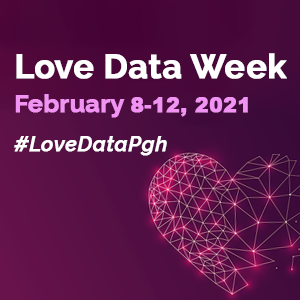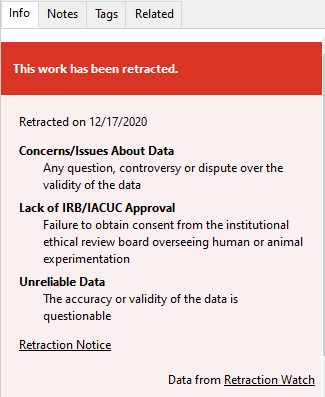Falk Library is open on a limited schedule, Monday-Friday, 7 a.m.-6 p.m. to support Main Desk activities, Pitt Print stations, and a limited number of study spaces for students. Visitors to the library will be required to show their valid Pitt ID and follow all University COVID-19 guidelines and best practices. Continue reading
Celebrating Love Data Week 2021
 The week of February 8-12, 2021, is Love Data Week, an international event designed to raise awareness about research data management, sharing, preservation, and—most importantly—how we can help you. To celebrate, HSLS Data Services will be hosting a variety of workshops and giveaways, and engaging with the community via social media.
The week of February 8-12, 2021, is Love Data Week, an international event designed to raise awareness about research data management, sharing, preservation, and—most importantly—how we can help you. To celebrate, HSLS Data Services will be hosting a variety of workshops and giveaways, and engaging with the community via social media.
Workshops
The HSLS classes offered during Love Data Week (online synchronous via Zoom) are listed below. Every class attendee will be entered into a raffle for a chance to win a gift card (mailed to winner). The more classes you attend, the more chances you have.
- Introduction to Research Data Management, February 8, 2–3 p.m.
- Data Management in R, February 9, 11 a.m.–12:30 p.m.
- Social Justice and Publicly Available Data, February 10, 10–11 a.m.
- Increase Your Data’s Discoverability with the Pitt Data Catalog, February 10, 1:30–2:30 p.m.
- Command Line Basics: Questions Hour, February 11, noon–1 p.m.
- Mapping Geographic Data with Tableau, February 12, 10–11 a.m.
Note: Zoom links will be sent upon registration (also available at the above class links). Continue reading
Systematically Evaluate the Research Literature with Critical Appraisal Tools
The January 2020 HSLS Update article, Write Better and Get Published: Health Research Reporting Guidelines, discussed health research reporting guidelines (RGs) which addressed the importance of clear and transparent writing. This article focuses on the importance of critical appraisal (CA) of study execution (also called study conduct) and provides tools to aid in the CA process as well as suggestions for settings to conduct critical appraisal.
Why critical appraisal? Simply put, critical appraisal of studies is key to the incorporation of quality research into evidence-based practice. Not all research is good; critical appraisal offers a reliable method of objectively identifying what is good about a study and what is not. It is a systematic method for reviewing study execution based on a validated checklist of items. Rather than relying on the reader to notice inconsistencies or incorrect analyses (i.e. making notes in the margin), a critical appraisal ensures that the appropriate questions are asked during each phase of the study from rationale to study method choice to discussion. Continue reading
Explore Human Gene/Disease Data with HGMD
- Do you need to verify that an observed mutation is associated with a particular human inherited disease?
- Are you researching a specific gene or disease and want to know its pathogenic mutational spectrum?
- Do you want reliable and frequently updated mutation data in order to perform thorough variant annotation?
The Human Gene Mutation Database (HGMD) is the long-lived gold standard resource for human hereditary disease mutation data. HSLS MolBio has provided limited access to HGMD Professional for many years (the Products Overview table shows the differences between the public and pro versions). Thanks to funding support from the Institute for Precision Medicine, we are pleased to announce an expansion of our licensing agreement with QIAGEN so that more Pitt researchers are able to use this comprehensive tool simultaneously. If you are a bioinformatician, clinical geneticist, diagnostician, or genetic counselor and are not already familiar with HGMD, now is the time to explore it! Register for access via the HSLS site license. Continue reading
Featured Workshop: Mapping Geographic Data with Tableau
Mapping Geographic Data with Tableau is a new hands-on workshop that introduces mapping and analyzing geographic data using Tableau. Recognized as the “world’s leading analytics platform,” Tableau is a data visualization software that allows users to explore and analyze data in seconds while reshaping the way we use and understand data. With a focus on data visualization, this workshop is ideal for anyone who needs to visualize data geographically or show how data elements are spatially distributed. Tableau is not a replacement for a GIS-focused application, but for anyone who has one data layer associated with location information, it can allow you to create some engaging visualizations. This workshop demonstrates how Tableau can take location data and any other joined data and plot it on a map. Options for customizing your visualization, grouping data, adding filters, and sharing your visualizations will also be discussed. Continue reading
is a new hands-on workshop that introduces mapping and analyzing geographic data using Tableau. Recognized as the “world’s leading analytics platform,” Tableau is a data visualization software that allows users to explore and analyze data in seconds while reshaping the way we use and understand data. With a focus on data visualization, this workshop is ideal for anyone who needs to visualize data geographically or show how data elements are spatially distributed. Tableau is not a replacement for a GIS-focused application, but for anyone who has one data layer associated with location information, it can allow you to create some engaging visualizations. This workshop demonstrates how Tableau can take location data and any other joined data and plot it on a map. Options for customizing your visualization, grouping data, adding filters, and sharing your visualizations will also be discussed. Continue reading
How to Avoid Citing a Retracted Article Using Zotero or EndNote

While retractions only account for approximately 0.04% of the published literature, unknowingly citing retracted articles in your own work can lead to serious problems. While you might know about using the Retraction Watch database to check for retractions, did you also know that your citation manager can be a tool for alerting you to retracted literature?
Zotero and Retraction Watch
Zotero’s integration with Retraction Watch (RW) means that you will get an alert if you add an article to your library that has been retracted or if an article already in your library is retracted at a later date.
However, this functionality is only as good and up to date as RW’s database. Sometimes items are not added to the database (and thus do not trigger Zotero’s alerts) until weeks after they have been retracted. Additionally, items that have been marked as having “cause for concern” and not officially retracted do not trigger any alerts in Zotero. Continue reading
Changes to the HSLS Online Collection for 2021
Journals added to the HSLS online collection for 2021 include:
- ASA Monitor
- Bioscience, Biotechnology, and Biochemistry
- British Veterinary Association titles: In Practice; Veterinary Record; Veterinary Record Case Reports
- Journal of Aquatic Physical Therapy
- Journal of Breast Imaging
- Journal of Maternal-Fetal & Neonatal Medicine
- Journal of Pain (resumed publication)
- Journal of Racial and Ethnic Health Disparities
- MEDSURG Nursing
- Metallomics
HSLS continually adds new open-access journals, so visit our E-journals A-Z list and click on “Show Select Subject” to view titles in your area of interest. Continue reading
Directory of Open Access Journals Refreshed for 2021
The Directory of Open Access Journals (DOAJ) is a free resource that allows users to locate open access, peer-reviewed journals. First launched in 2003, DOAJ’s mission is to “increase the visibility, accessibility, reputation, usage and impact of quality, peer-reviewed, open access scholarly research journals globally, regardless of discipline, geography or language.” In order to support this mission and stay impartial, DOAJ functions as an independent non-profit, with an advisory board and council. Additionally, there are basic criteria for inclusion that journals must meet in order to be accepted and remain on the directory.
If you have used DOAJ in the past, you might be familiar with the way the website used to look. At the end of 2020, it underwent a large website relaunch. Not only has it been modernized in terms of design, but it has also provided increased clarity and ease of searching. The updated DOAJ site emphasizes the larger search box on the homepage, while clearly presenting page navigation options and quick facts about the material you are searching. Continue reading
HSLS Staff News
The HSLS Staff News section includes recent HSLS presentations, publications, staff changes, staff promotions, degrees earned, etc.
Names in bold are HSLS-affiliated
Publications
Kelsey Cowles, Academic Coordinator, NNLM/Middle Atlantic Region:
Cowles K. Trusted resources for biomedical images. MLAConnect. 2020 Oct 29.
Cowles K, Sheppard M, Waltman E, Wilson TK. Crowdsourcing and collaboration from coast to coast: NNLM’s #CiteNLM Wikipedia edit-a-thons. Journal of Electronic Resources Librarianship. 2020;32(4):267-275. doi: 10.1080/1941126X.2020.1821991.
Jill Foust, Research and Instruction Librarian:
Wilckens KA, Stillman CM, Waiwood AM, Kang C, Leckie RL, Peven JC, Foust JE, Fraundorf SH, Erickson KI. Exercise interventions preserve hippocampal volume: A meta-analysis. Hippocampus. 2020 Dec 14. doi: 10.1002/hipo.23292. Epub ahead of print. PMID: 33315276.
Classes
HSLS offers classes in a wide array of subjects—molecular biology, database searching, bibliographic management, and more! You can quickly view all Upcoming Classes and Events or sign up to receive the weekly Upcoming HSLS Classes and Workshops email.
February’s featured class article is “Mapping Geographic Data with Tableau.” This is a new series that will highlight a different HSLS class each month.
Contact Ask a Librarian to find out more.
